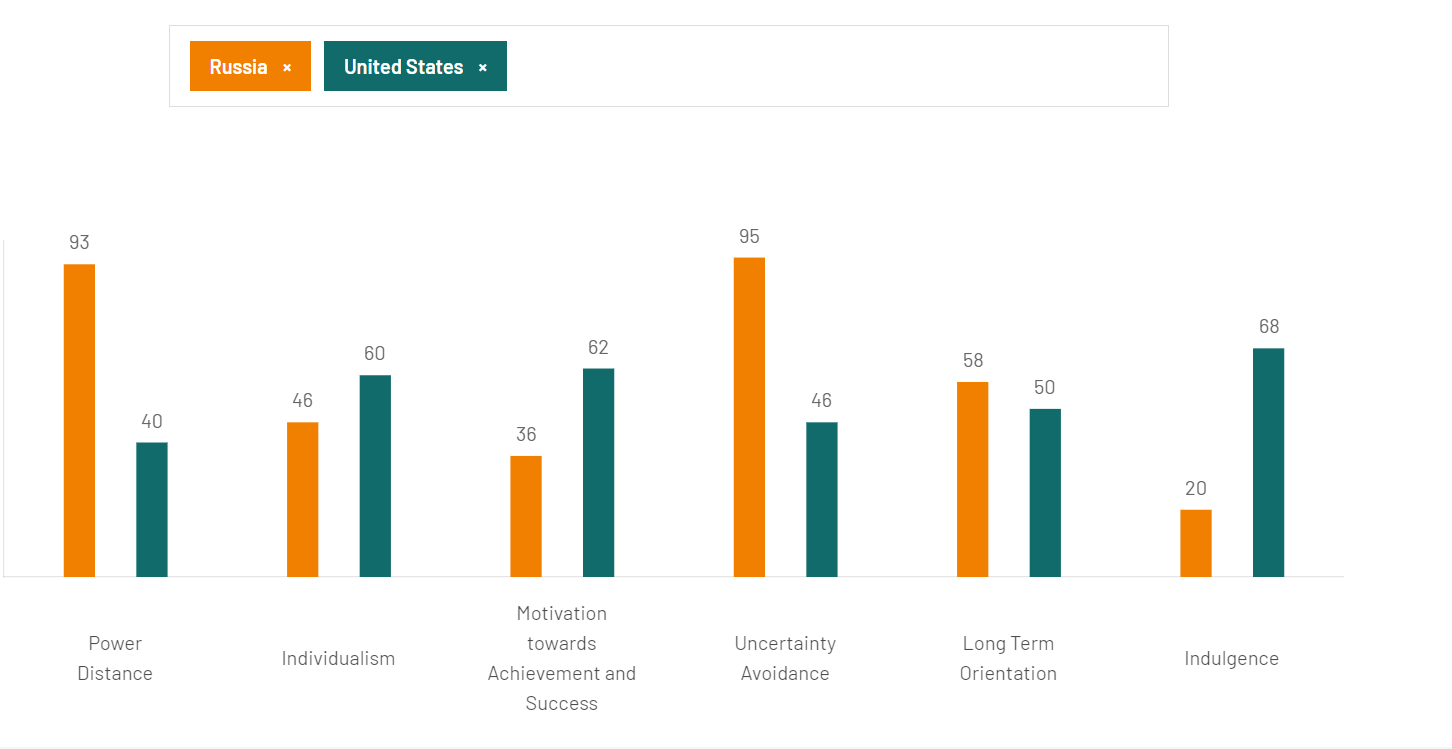Introduction
To launch an international business venture, establishing cultural connections is an important step. Geert Hofstede’s theory of six cultural dimensions can provide some initial insight from which to build. Figure 1 presents current results from a unique resource, where each of the six aspects is compared for two countries – the USA and Russia (Hofstede Insights, 2023). The key differences lie in the plane of power distance and uncertainty avoidance.
Cultural Comparison

Regarding power distance, in Russia, unlike the USA, the distance between superiors and subordinates is noticeably greater on all scales. In a business environment, this fact requires significant preparation for negotiations or similar events in Russia, where, in some cases, an informal atmosphere and openness of emotions are valued. However, despite such welcoming hospitality, the resources spent on solving problems that require the intervention of superiors are much more significant, both in time and often in financial or human-resource aspects. Similar processes in the USA are better optimized and proceed much more simply.
As a consequence of the previous point, Russia they are trying significantly to avoid uncertainties. Business relationships can be built on trust instead of written agreements, as the written part often requires going through a lengthy process due to one of the most complex bureaucracies in the world (Hofstede Insights, 2023). As stated above, in the United States, this activity requires less time which does not require a high level of verbal trust in business since written assurances do not take up many resources. As a result, Americans are more open to new ideas and are moderately conservative.
Such tendencies are still alien to Russia, where, as a consequence of such an approach, there may be various unacceptable stereotypes in a cultural context for Americans, just as openness and democracy on several issues may be met with hostility from that side. As a result, when negotiating, you need to be careful not to touch on such topics to promote the issues of the international enterprise better.
At the same time, both countries agree on a common-sense pragmatism that allows them to adapt traditions, show flexibility in the current time context, and make plans for the future. However, this future is not as distant as it may seem – and Russia and the United States are primarily looking for benefits shortly, assessing the given situation as often as possible: for example, financial statements every quarter (Hofstede Insights, 2023). Keeping your finger on the pulse this way can benefit negotiations since company representatives can agree on how the relationship should be monitored.
An important point is individualism, indulgence, and motivation towards achievements and success. Russians are more united but less optimistic and less likely to share their merits. American culture is opposite, but not polar – most of the US is prone to individualism and a positive attitude, which may result from the average power distance indicator. In negotiations, this factor should be taken into account, which negatively can manifest as concealment of any important information on the part of the Russians or, conversely, an excessive focus on individual benefits and merits on the part of the Americans.
Conclusion
These differences in cultural dimensions highlight the contrasting values, attitudes, and social norms between Russia and the United States. Understanding Hofstede’s dimensions is critical to effective communication and collaboration in international business as it helps identify potential problems and develops strategies for bridging cultural gaps, managing conflict, and adopting culturally sensitive approaches. However, it is always worth remembering that each person is unique, and such a model is only a guide: business people should always rely on ethics, common sense, and respect before applying cultural knowledge.
Reference
Hofstede Insights. (2023). Country comparison tool. Web.